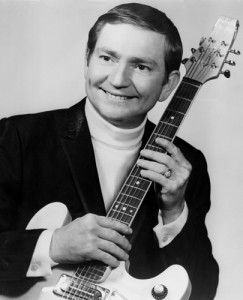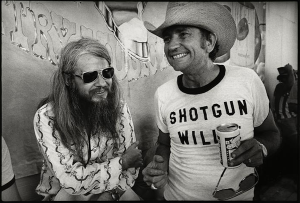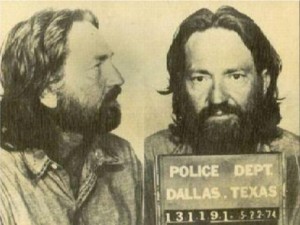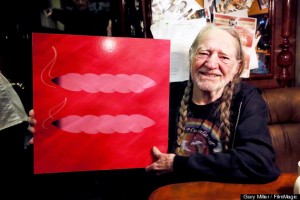Written by Drew Scherger. 2 March 2016.
“Me and Paul” is a song performed by Willie Nelson and released on his album Yesterday’s Wine in 1971. The song was also later featured on the compilation album Wanted: The Outlaws in 1976 as well as on several live albums. Willie wrote the song about the friendship between himself and his longtime drummer, Paul English. The song illustrates what his life was like on the road but also shows his frustrations with Nashville as well as mainstream American culture, which led him to eventually settle in Austin and embrace the Outlaw and Hippie movements.
Willie Nelson started his songwriting career at the age of 7 in his hometown of Abbott, Texas. As he grew up, he moved around the country, eventually settling down in Nashville as a successful songwriter. Some of his early hit writing credits include “Family Bible,” “Funny How Time Slips Away,” “Hello Walls,” and “Crazy”. His career as a performing artist, however, wasn’t going as well in Nashville  because many record executives thought that his voice that wouldn’t sell and that his singing and writing was too jazz influenced. Willie Nelson was a longtime fan of jazz music stemming back to his childhood days in Texas in the 30’s and 40’s when artists such as Bob Wills were blending country “hillbilly” music with big band jazz to create “western swing.” Willie along with many other country musicians was also big fan of Belgian-French jazz guitarist Django Reinhardt who played gypsy swing. Willie even recorded an album with Merle Haggard in 2015, Django and Jimmie that was a tribute to Django Reinhardt and country singer Jimmie Rodgers. Willie later remarked in an interview “Django is my all-time favorite guitar player…When I first heard him, I realized I’d really been influenced by his music for a long time. I’d been into Bob Wills a lot, and in his songs I could hear Django’s style” (Lewis). This jazz influence can be seen in Willie’s music through songs like “Crazy” in the chord structure or in “Me and Paul” through his singing lightly behind the beat and singing accented notes like the flat 7th of the chord in the line “my mind’s still fairly sound.” These vocal techniques create slight dissonance that wouldn’t always be accepted by producers whose main goals are to sell records.
because many record executives thought that his voice that wouldn’t sell and that his singing and writing was too jazz influenced. Willie Nelson was a longtime fan of jazz music stemming back to his childhood days in Texas in the 30’s and 40’s when artists such as Bob Wills were blending country “hillbilly” music with big band jazz to create “western swing.” Willie along with many other country musicians was also big fan of Belgian-French jazz guitarist Django Reinhardt who played gypsy swing. Willie even recorded an album with Merle Haggard in 2015, Django and Jimmie that was a tribute to Django Reinhardt and country singer Jimmie Rodgers. Willie later remarked in an interview “Django is my all-time favorite guitar player…When I first heard him, I realized I’d really been influenced by his music for a long time. I’d been into Bob Wills a lot, and in his songs I could hear Django’s style” (Lewis). This jazz influence can be seen in Willie’s music through songs like “Crazy” in the chord structure or in “Me and Paul” through his singing lightly behind the beat and singing accented notes like the flat 7th of the chord in the line “my mind’s still fairly sound.” These vocal techniques create slight dissonance that wouldn’t always be accepted by producers whose main goals are to sell records.
Willie was frustrated with record executives not believing that his jazz influenced material would sell and these frustrations ultimately led him to move back to Texas and settle in Austin. In Austin, he was free to write the music that he wanted to without record companies pressuring him to make music that he wasn’t passionate about just to sell records. With more creative control over his work in Texas, Willie released the albums Shotgun Willie (1973), Red Headed Stranger (1975), and Wanted! The Outlaws (1976), along with later more jazz oriented work such as Stardust (1978), which cemented his career among the greats in country m usic history. When Willie and other Texas born musicians such as Waylon Jennings led the exodus from Nashville in the 70’s they were seen as rebelling from the mainstream country scene and became known as the “outlaws.” The term came from a Waylon Jennings album called Ladies Love Outlaws (1972). They rebelled against the Nashville sound known for heavy production value instead often opting for more bare recordings (Red Headed Stranger) and a respect for traditional country music. In his popular song “Are You Sure Hank Done It This Way,” Waylon Jennings expressed his concern for where country music was going,
usic history. When Willie and other Texas born musicians such as Waylon Jennings led the exodus from Nashville in the 70’s they were seen as rebelling from the mainstream country scene and became known as the “outlaws.” The term came from a Waylon Jennings album called Ladies Love Outlaws (1972). They rebelled against the Nashville sound known for heavy production value instead often opting for more bare recordings (Red Headed Stranger) and a respect for traditional country music. In his popular song “Are You Sure Hank Done It This Way,” Waylon Jennings expressed his concern for where country music was going,
“Somebody told me when I came to Nashville,
Son you finally got it made.
Old Hank made it here, we’re all sure that you will
But I don’t think Hank done it this way.”
The Hank referred to in the song is Hank Williams, a favorite of many country traditionalists, like Waylon Jennings who longed for the simpler, more authentic music of the old days.
These outlaws were just as well known for their music as they were for their lifestyles and appearance. Willie and Waylon along with other outlaws such as Kris Kristofferson grew out their hair in rebellion to the Nashville clean-cut image. Paul English, the Paul from “Me and Paul,” had a glass eye and dressed like the devil onstage (Saving Country Music). These artists were also famous for their rock and roll lifestyles. Willie was later given the nickname, “Shotgun Willie” after an altercation with his daughter’s husband. After hearing that Lana’s husband Steve  was beating her, Willie went over to their house and slapped Steve around. As he later recalled, “I told him if he ever laid a hand on Lana again, I would come back and drown his ass.” Steve later came back firing at Willie’s house with a .22 rifle and Willie shot back with an M-1 rifle. Steve then kidnapped his and Lana’s son and drove back to Willie’s ranch where Willie shot out his tire with a shotgun (WillieNelson.com). Stories like this show that while the outlaw image was a character of sorts, a lot of these artists lived the part to some degree. This didn’t go with the standards of the time for country music stars that were usually expected to act more conservatively than rock musicians.
was beating her, Willie went over to their house and slapped Steve around. As he later recalled, “I told him if he ever laid a hand on Lana again, I would come back and drown his ass.” Steve later came back firing at Willie’s house with a .22 rifle and Willie shot back with an M-1 rifle. Steve then kidnapped his and Lana’s son and drove back to Willie’s ranch where Willie shot out his tire with a shotgun (WillieNelson.com). Stories like this show that while the outlaw image was a character of sorts, a lot of these artists lived the part to some degree. This didn’t go with the standards of the time for country music stars that were usually expected to act more conservatively than rock musicians.
At the time that “Me and Paul” was release d, in 1971, this outlaw movement wouldn’t take off for another four to five years. Willie wasn’t doing as well in his career as he had been earlier with his songwriting success. He wasn’t having as many songwriting hits, and many in the industry thought his vocal stylings were too strange to for him to become a successful performer. This is expressed in “Me and Paul through lyrics like “I thought Nashville was the roughest, but I know I said the same about them all.” This line in the song also shows Willie’s frustrations with not just Nashville but the culture throughout America that didn’t accept “longhairs” like him, Waylon, and the others who lived a different lifestyle than what was seen as normal behavior at the time. “Even Kris Kristofferson, a Brownsville born Rhodes scholar who followed the traditional path failed to fit in…more to the point his hair was too long” (Spong). Many of these artists were embracing the counterculture ideas of the 60’s and began seeking refuge among the hippie communities of Austin. Again, signs of Willie’s feelings of alienation from the normal world and aligning with hippie values begin to show in “Me and Paul”, predating his move to Austin.
d, in 1971, this outlaw movement wouldn’t take off for another four to five years. Willie wasn’t doing as well in his career as he had been earlier with his songwriting success. He wasn’t having as many songwriting hits, and many in the industry thought his vocal stylings were too strange to for him to become a successful performer. This is expressed in “Me and Paul through lyrics like “I thought Nashville was the roughest, but I know I said the same about them all.” This line in the song also shows Willie’s frustrations with not just Nashville but the culture throughout America that didn’t accept “longhairs” like him, Waylon, and the others who lived a different lifestyle than what was seen as normal behavior at the time. “Even Kris Kristofferson, a Brownsville born Rhodes scholar who followed the traditional path failed to fit in…more to the point his hair was too long” (Spong). Many of these artists were embracing the counterculture ideas of the 60’s and began seeking refuge among the hippie communities of Austin. Again, signs of Willie’s feelings of alienation from the normal world and aligning with hippie values begin to show in “Me and Paul”, predating his move to Austin.
“Almost busted in Laredo,
But for reasons that I’d rather not disclose,
But if you’re stayin’ in a motel there and leave,
Just don’t leave nothin’ in your clothes.
And at the airport in Milwaukee, they refused to let us board the plane at all,
They said we looked suspicious,
But I believe they like to pick on me and Paul.”
The references to drugs are another sign that Willie and the “outlaws” were moving on from the Nashville and mainstream American scene. Waylon was well known to have a bad cocaine problem, which reportedly cost him $1,500 daily. Willie is probably equally known for his music as he is for his advocacy of marijuana legalization. It wasn’t that Nashville artists weren’t doing drugs –Roger Miller had a terrible amphetamine addiction– it was that they were expected to try and hide it from the public light. In “Me and Paul,” Willie references almost getting busted for drugs as well as getting so drunk that he doesn’t even know if they played a show in Buffalo. Other musicians such as Waylon, Johnny Paycheck, and David Allan Coe also started covering topics that were covered earlier in the days of Hank Williams and rural folk musicians but were seen as taboo by some in the 60’s country music industry leaders.
The outlaw movement wasn’t the only big change to occur to country music in the 70’s when “Me and Paul” was released. Changes brought on by the Feminist Civil Rights Movements began to permeate the country music scene, usually known for its refusal to budge from traditional stances. This is reflected in the lyrics of “Me and Paul” when Willie talks about playing a package show in Buffalo with Kitty Wells and Charlie Pride. Country music fans from earlier times may have scoffed at the idea of a hippy, a black man, and a woman being three of the biggest country stars of the time. Charlie Pride got his start playing clubs in Montana. He initially hid photographs from the press so that they wouldn’t find out he was black and discriminate against him. However, it only took him his third single, “Just Between You and Me,” which reached Number 9 on the Country charts, for him to be nominated for a Grammy and achieve nationwide success. While Kitty Wells, “The Queen of Country Music” came onto the scene much earlier than Willie and Charlie Pride, she was another barrier breaker when she broke to the top of the country charts with “It Wasn’t God Who Made Honky Tonk Angels,” the first time a woman had ever done so. Willie Nelson continued to be on the side of civil rights throughout his career, later defending same-sex marriage, covering the song “Cowboys Are Frequently, Secretly Fond of Each Other.”
“Me and Paul” tells a lot about the career of Willie Nelson as well as what was going on in country music and the world in the early 70’s. The song predates Willie’s move from Tennessee to Austin but shows definitive signs of his future with the hippie movement as well as the outlaw country movement that would gain traction in the mid to late 70’s. The other artists mentioned in the song show that country music and the world itself were changing. The effects of the civil rights and feminist movements began to show as it was increasingly accepted to have non-white or male country artists be extremely successful and popular.
Works Cited
Nelson, Willie. “The Story Behind ‘Shotgun Willie.” WillieNelson.com. N.p., 19 Oct. 2013.Web. 24 Feb. 2016. www.willienelson.com/story/shotgun-willie/
Spong, John. “That 70’s Show.” Texas Monthly. Texas Monthly, Apr. 2012. Web. 24 Feb. 2016.
Saving Country Music. “Forgotten Outlaw-Paul “The Devil” English””, 6 Oct. 2009.Web. 24 Feb. 2016. www.savingcountrymusic.com/forgotten-outlaw-paul-the-devil-english/
Lewis, Randy. “Willie Nelson, Merle Haggard Are Country Kin on ‘Django and
Jimmie'” Los Angeles Times. Los Angeles Times, 3 June 2015. Web. 02 Mar. 2016.

